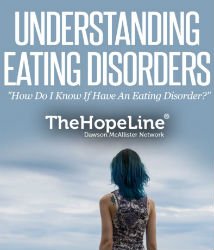Questions and Answers
I think a member of my family has an eating disorder, what should I do?
- Be direct – tell the person why you are worried and be specific
- Don’t make promises you cant keep
- Seek professional help for the person
- Learn as much as you can about eating disorders
- Ask them what it is like for them and how they are feeling
- Listen without judging – take the person’s fears seriously
- Encourage discussions about feelings and concerns
- Accept them for who they are, not how you think they should be, let them be their own person, even if it means having different ideas from your own (often people with eating disorders have a very fragile sense of who they are)
- Encourage non-food related activities and discussions
- Look at your families rules, behaviors and beliefs around food
- Read natural eating handouts
I feel overwhelmed, what should I do?
- Don’t blame yourself or him/her
- Get support for yourself as well
- Don’t let it interfere with your normal functioning – maintain your own life
- Set limits
Sometimes I feel so angry with this person, what should I do?
- None of us are perfect, we all make mistakes – you will get angry and frustrated sometimes
- Acknowledge your own feelings
- Use “I” statements
- Try to get angry at the eating disorder, not at the person who is suffering from it
How long will it take to get her/him well again?
- Have patience; Recovery is slow and putting on weight is not the only thing that needs to happen. Gaining weight without doing internal emotional work is not likely to last – the change needs to be from the inside out. Try to notice and reinforce small steps and small changes
Should I offer rewards for eating?
- If its helpful, sometimes rewards or little prizes do help, if the person is eating enough to do activities as usual
Should I watch them eat?
- Try not to scrutinize but of be aware of what is going in the persons mouth. Don’t ever trust reports of any eating you haven’t witnessed yourself
If they are not eating, should I make them eat?
- Tell the person that you are very worried about them, and that they need to eat in order to survive
Should I make them eat what the rest of the family is eating or should I let them eat whatever they want?
- Generally stick to what the rest of the family is eating, but make sure they are having a reasonable range of foods
She/he has asked me to buy certain foods and not buy others – should I cater for them in this way?
- No. Providing you have a range of foods available to them at all times, don’t agree to give them all the foods they think they want or need
Should I monitor their weight?
- No, let a professional do it.
- Be observant, but let a professional handle the specifics
I am worried about how big they are becoming, what should I do?
- Don’t make any comments about their weight
- Don’t worry about it, there is nothing wrong with putting on weight in itself
- Read booklets and other literature on weight and health
- It may be a sign of something else being wrong, so check how they are generally – try and talk to the person as much as you can
- Make sure you have a range of foods in your house that are all available to her/him to eat when they want to
- Read booklets and other literature on natural eating
I’ve notices food going missing / food in this person’s bedroom / hidden or stashed food wrappers – what should I do?
- Talk to the person and tell them what you have been noticing
- Ask them how they are and how they are feeling, perhaps encourage them to see a counsellor
- Again make sure that you have a range of foods in your house that are all available to them to eat when they want to
- Don’t talk about food being good or bad
- Don’t talk about diets
I feel like this person’s food issues are taking over our whole family, what should I do?
- Try to keep your family activities and routine as normal as possible, show that you love the person but keep your lives going
- Make sure that you give equal love to all your children, and that you spend time with your partner and close friends
- Have time out
- Be united with your partner or close friends that are involved about issues regarding eating disorders
- Don’t have lots of discussions about food
- Let the person maintain control over their own life/activities and take responsibility for their own actions
- Don’t make decisions for them
- Try to make your family understand that sometimes lives need to change and people who need help may need to get more attention than others









Recent Comments